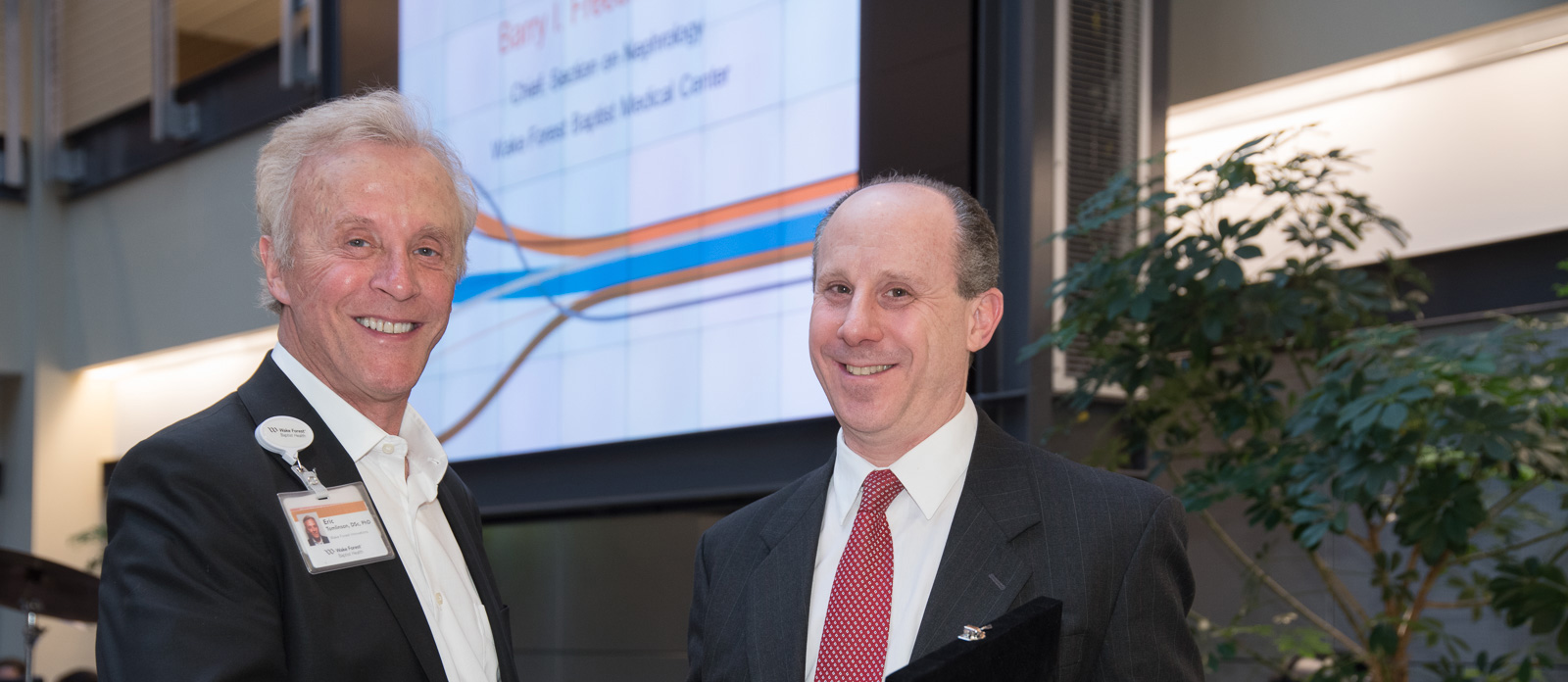Though he’s lived in Winston-Salem for nearly 30 years, Barry Freedman, MD, still sounds like a New Yorker.
“I can get in more words per minute than just about anyone else at the Medical Center,” said Freedman, the John H. Felts, III MD Distinguished Professor of Internal Medicine and section chief of nephrology at Wake Forest Baptist Medical Center.
Freedman also possesses certain non-linguistic characteristics rooted in his native Brooklyn – particularly perseverance.
This quality served him well in his medical career, during which he has relentlessly championed the link between genetic variation and the incidence of non-diabetic kidney disease in African Americans, which is significantly higher than in other populations.
That relentlessness – and the discoveries that came as a result – earned him the latest Innovation Award, which recognizes people whose work impacts lives and improves patient care. The award was presented to Freedman by Eric Tomlinson, chief innovation officer at Wake Forest Baptist and president of Wake Forest Innovation Quarter, at the spring Network Night event held March 31 at Wake Forest Biotech Place.

When Freedman first advanced his theory in the early 1990’s – arising from his clinical experiences as a fellow and staff nephrologist at Wake Forest Baptist – it ran into strong and at times hostile resistance because it ran counter to conventional medical wisdom. And that opposition, which included numerous grant-proposal and manuscript rejections, remained stiff for nearly two decades.
“If I didn’t have my New York perseverance I might have given up,” Freedman said.
But he didn’t. In 2010, a Freedman-led Wake Forest Baptist research team with colleagues and scientists at Beth Israel Deaconess Medical Center in Boston and the National Institute of Diabetes and Digestive and Kidney Diseases identified two variants in the apolipoprotein L1 gene (APOL1) that are present only in people with recent African ancestry and contribute to multiple forms of kidney disease in African Americans.
“We turned the established thinking upside-down,” Freedman said. “The conventional notion was that high blood pressure commonly caused kidneys to fail in African Americans. But we showed that in people with the causative APOL1 gene variants, it was kidney failure that came first and led to hypertension.”
Today, Freedman’s once-scorned views about the connection between genes and kidney disease in African Americans have attained wide acceptance. But that doesn’t mean he’s stopped investigating.
“Identifying the gene was critically important, but now we have to find a cure,” Freedman said.
While working toward that goal (and conducting other research, seeing patients, and administering the nephrology section and kidney & dialysis service line), Freedman recently developed a genetic testing service in collaboration with Wake Forest Baptist, its HLA/Immunogenetics Laboratory and Wake Forest Innovations.
The test can determine the presence of the APOL1 gene variants that predict risk for kidney disease and the more-rapid failure of transplanted kidneys from African American kidney donors. The service, currently available to physicians in 34 states and the District of Columbia, delivers results within 72 hours of receipt of blood samples from living potential kidney donors and at-risk patients. Results can be provided within hours for testing deceased kidney donors. Information is available at Apol1GeneTest.com.
“Thirteen percent of African Americans carry high risk APOL1 genotypes; these cause approximately 40 percent of all cases of end-stage kidney disease in the African American population that require dialysis treatments or a kidney transplant,” Freedman said. “The testing service provides results that inform physicians, patients, and potential kidney donors. They may also aid family planning, as well as protect kidney donors and recipients of transplanted kidneys.”
Freedman credits the collaborative atmosphere at Wake Forest Baptist for much of his success. “There are no barriers between departments or divisions here,” Freedman said. “That’s the amazing thing about Wake Forest. I love the collegial, multi-disciplinary team approach to science.”
“I simply knew what clinical questions needed to be answered in order to help our patients with kidney disease. I received support from geneticists, basic scientists, statisticians and people in many administrative areas at Wake Forest. Together, this team helped answer the key questions and produced a breakthrough in patient care.”
“One person simply can’t do it all. At Wake Forest, no one has to do it on their own.”
by Wayne Mogielnicki



